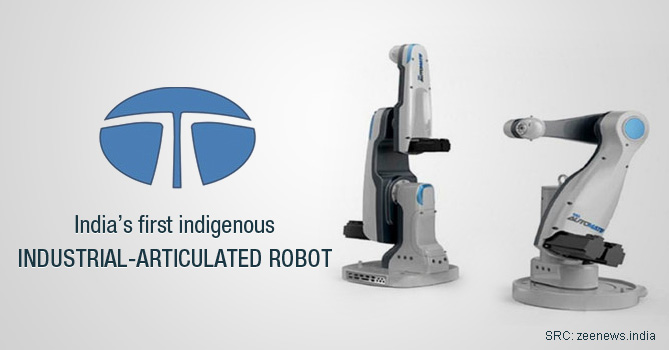Industrial robotics is going to be the next frontier for the Indian manufacturing industry as India readies to emerge as a major industrial manufacturing hub.
Tapping into this lucrative business opportunity by taking first mover advantage, is TAL Manufacturing Systems, a wholly owned subsidiary of Tata Motors, which is all set to launch Tata Brabo – India’s first indigenous industrial-articulated robot.
Tata Brabo – the potential game changer for MSMEs
TAL Manufacturing Systems has rightly identified a vast and untapped niche for mini-industrial robots that seeks to improve manufacturing and assembly efficiency at the floor level, with special focus to meet the needs of the MSME industry in India.
Tata Brabo is geared to handle payloads of 2 kilogram, 5 kilogram and 10 kilogram and will find application in electronics, automotive, pharmaceutical, food processing, logistics, packaging, and several other industries.
Challenges faced by small and medium industries
The MSME sector in India is currently stressed and is facing several challenges and they are:
- Rising wages
- Lack of affordable and skilled labour
- Rising prices of raw materials
- Use of inefficient and obsolete machinery
- Lack of adequate working capital
- Varying taxes between states
- Inflexible labour laws
- Lack of stable and long-term policy
With the current government putting maximum thrust in modernizing and expanding the domestic manufacturing base through programme initiatives like Make in India, the MSME sector will have to overcome the above challenges.
This sector provides the largest employment opportunity in India and will need to adopt automation in order to improve manufacturing efficiency and keep costs in check. However, since industrial robotics are mostly imported and therefore costly, only larger industries have introduced part, if not full, automation in manufacturing.
The lack of affordable but efficient automation options for the MSME sector presents a vast opportunity and TAL manufacturing Systems has rightly decided to develop much needed solutions to this vital sector.
First mover advantage and market potential
With Tata Brabo, TAL Manufacturing Systems has taken first mover advantage. The opportunity and market potential can be gauged by the fact that the present MSME sector generates around Rs 9,000 crore turnover and is likely to cross Rs 20,000 crore, in the next 3-5 years.
Presently, the industrial automation industry is dominated by larger companies like ABB, Fanuc, Siemens, Hitachi, and Kuka, which offer highly specialized and efficient systems but are largely suitable for large scale manufacturing. Some companies like Panasonic, Toshiba, Universal and Nachi have developed robotics to support small scale manufacturing but these are still expensive for the highly price sensitive MSME sector in India.
As per the International Federation of Robotics, the global demand for industrial robots will touch 5,000. TAL manufacturing Systems believes that the market for smaller robots in India is likely to exceed 15,000, and this is where TAL is geared up to provide very affordable and efficient robots that can improve both manufacturing efficiency and boost productivity, at a competitive cost.
The potential for export of such robots to emerging markets in South East Asia, Africa and Latin America is significant, and if TAL can get its product offer correct, it will be yet another milestone for the highly diversified Tata Group.
The Tata Brabo has the potential to be a game changer, just as the Tata Ace from Tata Motors created a new niche, a few years back, in a crowded market and then took first mover advantage to cement its position in that segment. Brabo is all set to repeat that.
At price points ranging from a low Rs 3 lakh for a 2 kilo payload to Rs 6 lakh for a 10 kilo payload, Tata Brabo will offer very competitive options for a manufacturer. International companies eying this segment will find it hard to compete with Tata’s prices which are expected to be at least 40% below their existing prices.
The numbers work in Tata’s favour. The average gross salary of a skilled industrial worker today ranges between Rs 30,000 to Rs 50,000 per month. That translates to around Rs 6 lakh annually for the upper price band. The robot will provide higher production efficiency and turnaround times since it does not require any tea or toilet brakes and can work all three shifts, if needed.
For a small scale manufacturer, who is already reeling under rising costs and lack of working capital, Tata Brabo will come as a godsend. To ensure market acceptance and penetration, Tata Capital is stepping in to provide the necessary capital financing on attractive terms to potential buyers, and there will be many.
The ideation behind Tata Brabo
It was back in May 2014, when Anil Bhingurde, COO TAL, made a passionate presentation to the Chairman Ravikant and the Board of Directors, on the potential for robotics in India and what they had developed as a prototype. The initial prototype demonstrated its capability by garlanding the Chairman but there is an interesting story of what happened thereafter.
Bhingurde during his presentation on the potential for their robot spoke of the market size to be of a couple of hundred units annually. The Chairman quipped that he missed out on a couple of zeros and asked Bhingurde to rework the market potential and revert.
Anil Bhingurde and his team, comprising six young passionate engineers with an average age of 24, got back to the drawing board and with some assistance from group company Tata Elxi on design styling and manufacturing inputs from Tata AutoComp, the young team went on to develop the first prototype of Tata Brabo that was showcased at the Make in India fair in Mumbai earlier this year.
Will Tata Brabo trigger the automation versus labour debate?
While it is true that automation of production and assembly does substitute labour to an extent, Tata Brabo will have limited impact on labour substitution in the short or even medium term, as most of the manufacturing processes in the MSME sector will still require labour and automation will be for limited works only.
But phased introduction of industrial automation is inevitable, if India has to meet the ambitious turnover goals that the government has set. And Tata Brabo will be right up there playing a definitive part.
If Tata Brabo emerges as a successful model, India will see many more players enter this lucrative segment in the coming years, besides inspiring a new generation of engineers to come forward to showcase their innovative talent. That may be great news for the industry but it will also require labour reallocation and re-skilling for alternate jobs.
It’s time for India to change gears.
Read More…





